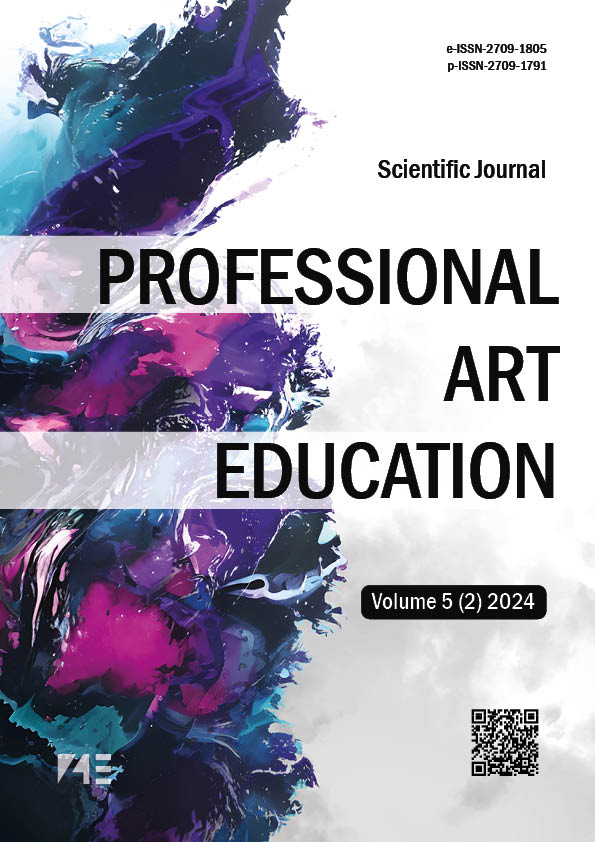Music internet resources in the training of future teachers: the experience of China and Ukraine
DOI:
https://doi.org/10.34142/27091805.2024.5.02.01Keywords:
Internet resources, music teacher, teacher training, , institutions of higher pedagogical education, China, UkraineAbstract
Object. The article analyzes the peculiarities of the use of educational and informational Internet resources in the practice of higher music-pedagogical education in China and Ukraine (collections of all kinds of materials, web sites of educational institutions, centers, museums, galleries, mass media, publications, etc.; online manuals, textbooks, reference books, encyclopedias, etc.). Examples and specifics of the use of the specified types of Internet resources are given.
Methods & methodology. On the basis of the functional approach, the following types of Internet resources are distinguished, which are used in the educational process in institutions of higher musical and pedagogical education: Internet resources for educational and organizational purposes (for communication, planning, control of educational achievements, distance learning); educational and activity purposes (trainers, interactive exercises, gamified resources, virtual laboratories, interactive models, etc.), educational and instrumental purposes (for creating various types of educational materials).
The scientific novelty is that the features of Internet resources have been determined, which meet the educational goals and tasks of training future teachers and organically fit into the general structure of the educational process, supplementing traditional teaching methods. The advanced practical experience of using the entire spectrum of Internet resources in the work of institutions of higher musical and pedagogical education was analyzed.
Results. It has been proven that common trends are being monitored in China and Ukraine - the rapid expansion of the range of Internet resources with educational content for the training of future music teachers; wide participation in the educational Internet space of music and art institutions and institutions, mass media, publications, etc.; increasing the number and quality of online educational resources that provide access to online manuals, textbooks, reference books, encyclopedias, etc. for the training of future music teachers.
Conclusions. Common trends are being observed in China and Ukraine - the rapid expansion of the range of Internet resources with educational content for the training of future music teachers. There is a growing number of online educational resources that provide access to online manuals, textbooks, reference books, encyclopedias, etc. for the training of future music teachers. In China, educational and informational Internet resources of musical and pedagogical education are closely and systematically integrated with the national education system, supported at the state level. In Ukraine, the use of educational and informational Internet resources is very popular and widespread - participants in the educational process have access to a wide range of international materials, which allows for the prompt inclusion of modern approaches and methods in the educational process, but requires certain systematization and unification to improve quality and productivity.
Downloads
References
Fomin, V., Sokolova, A., Dzivaltivskyi, M., Vasylieva, O., Parfentieva, I., & Martynenko, I. (2022). Peculiarities of Training Future Teachers of Music Art in Higher Educational Institutions in Terms of Distance Learning. Revista Romaneasca Pentru Educatie Multidimensionala, 14(4), 219-229. https://doi.org/10.18662/rrem/14.4/638
Kominarets, T., Fomin, V., Bieloliptseva, O., Tkachenko, M., Malykhin, A., & Pryshliak, O. (2022). Strategic Tasks of Contemporary Education: Formal, Nonformal, Informal. Revista Romaneasca Pentru Educatie Multidimensionala, 14(4), 394-407. https://doi.org/10.18662/rrem/14.4/647
Sokolova, A., Fomin, V., Tkachenko, M., Vasylieva, O., Parfentieva, I., & Martynenko, I. (2022). Professionally Oriented Tasks in the System of Professional Training of Musical Art Teachers. Revista Romaneasca Pentru Educatie Multidimensionala, 14(2), 257-267. https://doi.org/10.18662/rrem/14.2/579
Беземчук, Л., & Фомін, В. (2021). Моделювання професійно-орієнтованих завдань засобами інноваційних форм підготовки майбутнього вчителя музичного мистецтва. Professional Art Education, 2(2), 13-21. https://doi.org/10.34142/27091805.2021.2.02.02
Доброскок, І., Наливайко, О., Рибалко, Л., Жерновникова О. (2020). Впровадження цифрових ресурсів у процес підготовки музикантів-педагогів у навчальних закладах КНР. Професійна освіта: методологія, теорія та технології, (12), 66-89. https://doi.org/10.31470/2415-3729-2020-12-66-89
Кім, О. (2023). Реалізація міжпредметних зразків на уроках музичного мистецтва: (на прикладі комбінованого уроку в 6-му класі з планової теми «Рондо»). Professional Art Education, 4(2), 21-29. https://doi.org/10.34142/27091805.2023.4.02.03
Костікова, І. І. (2020). Інтеграція новітніх технологій в освіту Китаю. Educational Challenges, (61), 91-97.
Лі Хайцзюань (2023). Цифрові технології для мистецької освітньої галузі. Цифрова трансформація освіти та науки : матеріали І Всеукр. наук.-практ. конф., 2–3 берез. 2023 р. Харків. нац. пед. ун-т ім. Г. С. Сковороди [та ін.]. Харків.
Пономарьова, Н., & Хайцзюань, Л. (2024). Цифрові ресурси у професійній педагогічній освіті. New Collegium, 114(2), 43–48. https://doi.org/10.34142/nc.2024.2.43.
Прошкін, В. (2017). Освітні веб-ресурси в професійній підготовці майбутніх учителів. Освітологічний дискурс, 1-2 (16-17). 183-197.
Собченко, Т. М. (2022). Використання цифрових сервісів та інструментів у процесі професійної підготовки майбутніх учителів музичного мистецтва. Науковий журнал Хортицької національної академії. Сер. : Педагогіка. Соціальна робота, 2 (7), 93–100. https://doi.org/10.51706/2707-3076-2022-7-10.
Фан, М., & Матвєєва, О. (2021). Шляхи впровадження інформаційних технологій у підготовку вчителів музичного мистецтва: (китайський та український досвід). Professional Art Education, 2(1), 67–75. https://doi.org/10.34142/27091805.2021.2.01.09
Downloads
Published
License
Copyright (c) 2024 Лі Хайцзюань, Наталія Пономарьова (Автор)

This work is licensed under a Creative Commons Attribution-NonCommercial 4.0 International License.















